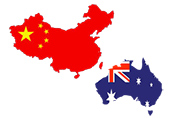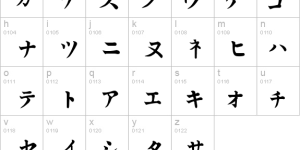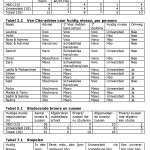My Story ~ 22. Only By Creating Your Own World Can You Create A Real Life
No comments yet “While everyone who chooses to go abroad possesses his own dream, one thing is for certain – a brighter future.”
“While everyone who chooses to go abroad possesses his own dream, one thing is for certain – a brighter future.”
Though having lived in Perth for almost 30 years, life back in China is still clear in my head. After the opening-up policy was introduced in the 1980s, many people were desperate to go abroad to pursue their dreams, thinking that only in this way could they realize their person goal and create their own happy life. Well, I was the opposite. There were two reasons: on the one hand, my mom was quite conservative and strongly opposed this view. She didn’t want her daughter to be away. On the other hand, I majored in traditional Chinese medical science and franking speaking, I didn’t know what I could do in foreign lands.
My husband majored in science and engineering and taught in a college. People were crazy about going abroad when we fell in love. However, my mom didn’t agree with our relationship. In her mind, once the couple live separate lives, there is a big possibility that one or either of them will change. Well, the son-in-law of her friend went abroad and this young couple was quite close in the first two years. The phone calls were expensive, dozens of dollars per minute while the total salary was only 50 dollars. The husband would call his wife, but the frequency of calls gradually became less and less and finally totally disappeared. The wife had to raise their child all alone in China and it turned out to be that she had no one to divorce with as her husband was nowhere to be found. Well, she finally had to go to the court and explained that her husband was missing, finally the divorce was granted. This left a deep impression on my parents, so my mom insisted that if he must go abroad, we couldn’t get married until he returned back. As a result, we dropped this idea and got married, we no longer thought about going abroad.
After opening up, people began to focus more on schooling and qualifications. My husband was doing a good job at college and was promoted to the position of deputy director, he was considered to be an outstanding young talent. He has got a master’s degree and his major was not available at his college, it was impossible to pursue further study. He really wanted to go higher, but without a degree, everything was a daydream. It was at that time that he got an opportunity to study with a government sponsorship. In 1987, he went to University of Melbourne to be a visiting scholar for one and a half years. Later, he wrote me a letter and discussed with me about his idea of applying for a scholarship and doing PhD, this meant I would have to wait for him for another four years. During that period, he couldn’t come back and government policy then didn’t allow visiting either. It was too hard for me and I just couldn’t agree, so he came back.
Our daughter was born after he returned home; we lived our life just like other common couple. However, he got another chance of studying for a PhD and sponsorship was available due to his position of deputy director and his excellent English. Registration was quite urgent so he made his decision without consulting me. Given my daughter was too young and needed to be cared for, my night shift at hospital, plus my poor health, would definitely put me into a difficult situation without him being around. So he turned down the study opportunity. One year later, another opportunity arose and his supervisor asked about his willingness to apply again. I told him not to give up because many young people had got PhD and if he missed this opportunity; his development would be held back. What’s more, I could accompany him with a scholarship. So this time, he made up his mind and we really expected a good development in China afterwards. His scholarship to Australia Sponsoring Third World Countries, actually required that he must go back to work in China after completing his study. So after six years of his staying abroad, in 1993 I went to visit him with my four-year-old daughter.
I studied traditional Chinese medical science in Shandong University of Traditional Chinese Medicine. After graduation, I was required to work at the Chinese Medicine Hospital of Jinan, Shandong, as an acupuncturist. I was the first person with a formal five-year education in college after the Cultural Revolution in our department, so I received high praise both from our hospital and our department.
The main reason I refused to go abroad was because of my interest in the position of physician-in-charge. Promotion at that time was quite difficult due to qualification and seniority. It took me about two years from application, approval at various levels, official documents from Health Bureau to final certification. Also, I had been working there for ten years, thus I didn’t want to give up, and I would feel desperate at the thought of not coming back. My husband thought the same. Well, visiting and sightseeing could be carried out after my promotion. It would be just a matter of time.
My promotion certificate soon came and I hurried to Australia with my daughter. The memory of my first day in Australia still lingers in my mind. I had never been abroad, never flown, neither could I speak English. I learnt English during my college years but I never got the chance of using the language. So the first flight was a big problem. There was no direct flight from China to Perth and we had to transfer in Singapore. I didn’t know English so I couldn’t read the signs and didn’t know where to go. A friend of my husband came back to Beijing for a meeting and he accompanied me to Australia.
What I have perceived from TV is that foreign countries are full of high buildings, neon lights and are prosperous, much more prosperous than Beijing. However, the more I walked, the more desolate I became. All I saw was primeval forest and wasted grass land; also there were huge lakes and lots of mosquitoes. Anyway, it looked like a desert with no people around which was totally different from what I had imagined. Even a Chinese village is better than here. Our car finally pulled up before a house which was rented by my husband and his classmates.
After all these years’ living, I actually think that the air here is clean and weather is fine, while the biggest advantage is the small population and the pace of life here which is more relaxed. Interpersonal relationships in China are much more complicated, especially for those who were born into an intellectual family like mine which had few chances to see the world. My father was a professor at Shandong Normal University, so I had always been around that area since kindergarten. What I experienced in Australia was much simpler. Relationships in China are always complex and hard to handle, including relationships among workmates. I’m now independent and work three days a week. Basically I do acupuncture at home but I also go to a friend’s clinic about two days a week.
It has been 30 years since I came to Australia. I remember, there were hard days to go through, or in other words, I was quite puzzled at that time. There was a great income gap in the first several years after I came here and we had to live on the scholarship. Frankly speaking, his scholarship was quite high compared to other students but we still encountered great pressure. Apart from renting, we had to pay high living expenses. People in China always thought those staying abroad earn big money, so we saved money to save face and gave our relatives presents when we went back to visit them. Another pressure came from the language. I didn’t know how to say hello to neighbors, actually I didn’t know what they were talking about, and all I could do was smile. I couldn’t read labels either so I didn’t know the ingredients, let alone know how to communicate with doctors in hospital. I needed my husband to handle my daughter’s schooling and banking too. I suddenly felt like a fool. But in order to solve our economic problem, I had to work in a factory, which meant a bigger drop in status. From a doctor-in-charge at a hospital to a worker, I felt awful and aggrieved. I had sacrificed myself for my husband. My mom thought so too. What’s worse, I didn’t dare to tell anyone about my factory work. I was depressed and didn’t know when my life would improve.
I felt I had an equal position when we were both in China because we both had our own income and salary. So I never had to ask him for his permission and just bought whatever I wanted. However, here in Australia, if we went to a supermarket and I wanted to buy a certain product, he would tell me that maybe it would be on sale the next week, so we should just wait and see. I had to put it back on the shelf, which made me awful. I had no income and had to buy everything with his money. I had no confidence and felt of little value.
I decided to learn English so I could find myself a job. Since I wanted to live here in the long run, English is definitely a must. After three years’ hard work at an English Training Centre, my English was better and I could communicate with others without difficulty. I experienced no problems in hospital or in store and I didn’t feel isolated any more. Now I can utilize my major, I find myself again.
As life is getting better, we started to consider settling down here for the long term. My husband went on to study postdoc after graduation. As for my daughter, since she is already nine years old, it would be hard for her to fit into the environment in China with a different education system. I once tried to teach her Chinese and math and forced her to study using the text books, exercises and test papers which were sent to us by my mom in China. However, I didn’t have enough time to supervise due to the factory work. I was just too tired to care for her study, so this plan was finally dropped.
I had never done any manual work in China and the experience of working in a shrimp factory is really unforgettable, a process I found difficult to accept. The main job was to pack shrimps. My English was very poor at that time and a friend introduced me this job. So I thought I must grasp the opportunity because it paid 10 dollars per hour, much higher than the previous work in an Italian restaurant which paid only five dollars an hour. I was quite satisfied and decided to work hard in case I lost my job. I was like a dumb person because I didn’t know English. My manager taught me, I watched him and did as he did. I could not understand his English but worked hard. Finally I surprisingly was recognised as a monthly model worker and was awarded a kilo of shrimp and a bottle of brandy. I put the picture of me receiving the award in the workshop to inspire others to learn from me. Although there’s a big smile on the face when I received this award, I felt awful deep in the heart. I didn’t know how to express myself, should I be happy or sad? Isn’t it an honorable thing to receive this award? But I thought of my daughter, and decided I would just work harder.
Actually I was desperate and wanted to go back to China at that time and wanted my daughter to attend a local school to improve her Chinese level which was becoming poorer and poorer. Every time before her Chinese lesson, there would be a fight, shouting and crying or even beating, and my daughter would cry to me:” Mother, it’s too hard.” I felt sorry for her and would think to myself: what am I doing? I’m like a demon forcing her to learn, so I gradually gave up. I thought of going back to China, but at once my husband’s career and my daughter came into my mind, I would forget it. She was nine at that time and if we went back, she would be upset to enter the first grade again and I was afraid she would be unable to recover from such a setback. So we started to consider settling down here. I was willing to give up my dream of becoming a professor for the future of my husband and child.
Many people are like me. They don’t focus completely on themselves but consider the family or other reasons. It’s been over 30 years and am I a Chinese or an Australian? As I have got Australian passport, I’m theoretically Australian but I just feel like a half, after all I lived in China for the first 33 years. I was born there and grew up there. I went abroad at the age of 32 and have lived in Australia for over 30 years. Seeing life as a whole, I will live better here and probably will end my life here.
I felt I was Chinese when I first came here and even when I got the passport. Perhaps it is because the longer we live, the deeper relationships we develop. Wherever you go, people can tell you are Chinese and I feel that as well. What’s more, China is my motherland and I have lots of memories there. My family and friends are there with my roots. I’m Chinese forever.
I remember at the 2000 Sydney Olympic Games an Australian athlete won a gold medal, I felt like an Australian and was proud of him. But when a Chinese athlete won a medal, I felt like a Chinese and cried for him. Such emotions are complex, shall I keep my left hand or my right hand?
Festivals always remind people of their roots. I will think of Chinese National Day when it’s Australia Day holiday and want to go back to China. The time when the Australian flag flies and the national song is sung, everyone joins in. Frankly speaking, I still can’t sing it but I feel I am with them and possess that kind of surging in heart. There’s proud and recognition too. Although we have settled here and going back to China is like a holiday, we still perceive it as our home and Australia in turn feels like a holiday. My mom’s passing away took my Chinese home away. Maybe this has to do with personal emotions like many other people. From then on, my homesick changed to Perth and being in China like a holiday. There’s no sense of home.
There’s still a gap living with the mainstream and you can’t fit in completely, though my husband teaches in college. People in the upper class have this kind of feeling too, they are not recognized as mainstream. In my mind, as my work is in Chinese medicine, people are more willing to accept Chinese medicine than before but I still can’t feel it. There are a lot of Australians in my clinic and half of my patients are Australian. I have no trouble communicating with them but still can’t fit in. There were several times when I was in my car and heard someone open his car window and shout at me: “go back to your home!” Well, I haven’t heard such rude words in the past ten years. I believe many foreign immigrants might also have come across such a situation. Maybe it’s because the society has changed and people are more tolerate and accept foreign things, including Chinese medicine. But I have not truly integrated in the local culture and I know many people are not talking from their heart.
In my mind, those Australian, especially those who have received high education, know they should not come up with racial abuse. But by their actions when they are handling issues you can see, there’s a little prejudice in their hearts. During conversation with others, I find many people have the same feeling. In other words, it’s hard to get close to Australians, even your friends. Probably it’s affected by life style and evaluation which has an affect on your attitude and thoughts. Though I have an Australian passport, I’m still Chinese in heart.
In cultural recognition, the next generation is closer to Australia. According to our Chinese tradition, young people will live and eat at home and feel that is what should be. My daughter has grown up and she moved out when she found a job which made me feel puzzled and worried as a mother. In the Chinese tradition, she should live with us and we can save money for her to buy car and house, but in her mind, either in core values or life style, there’s a big difference and she prefers to do what Australian people do. She is quite independent since a kid and thinks it is shame to ask her parents for money. We actually have never taught her this. She is our only daughter and everything except what we use will belong to her. But in her mind, these things are ours and she will never take them for granted. So she moved out once she found a job.
There’s an old saying:”fallen leaves return to the roots”. Old friends and classmates ask whether we will return to China after retirement. Well, actually I won’t. Each place has its own ways of supporting the elderly. I will continue my Chinese medicine career here till life ends. It’s better that as a Chinese medicine doctor, you can continue to work as long as you are healthy. You can understand the emptiness of being old and will not lose your value as a human being if you continue to be active. Probably the working days will be reduced, two or three days a week. But I will continue until there’s no choice, not for money, but just for something I have to do and feel as though I am still a useful member of the community. I love my husband and child, share happiness and sorrows with them because it was I who brought them here.
You May Also Like
Comments
Leave a Reply









